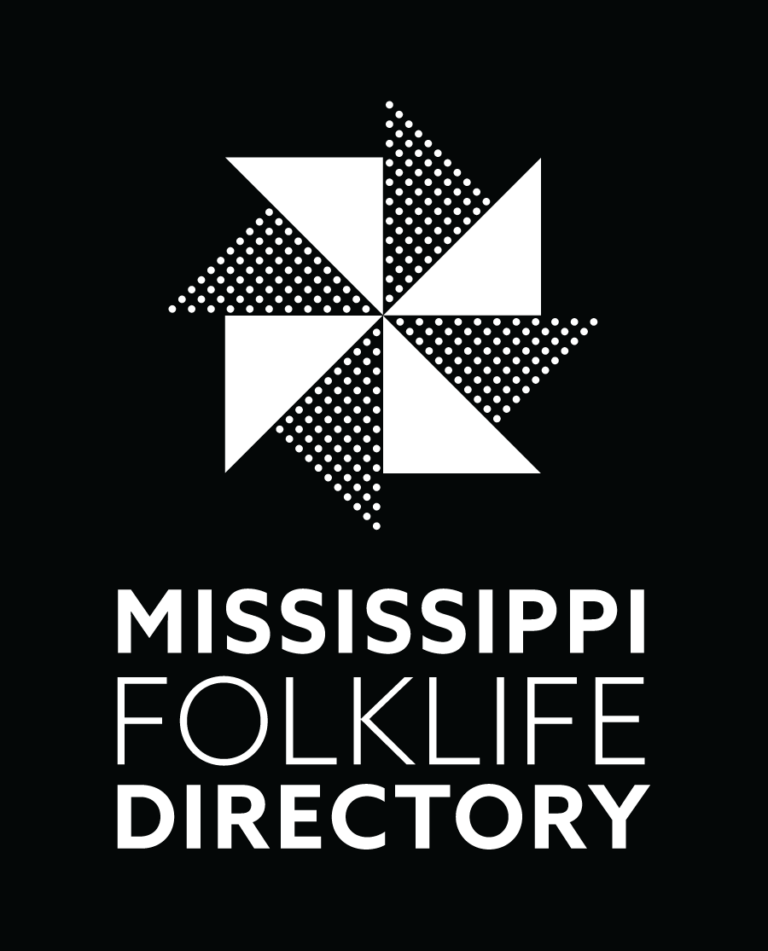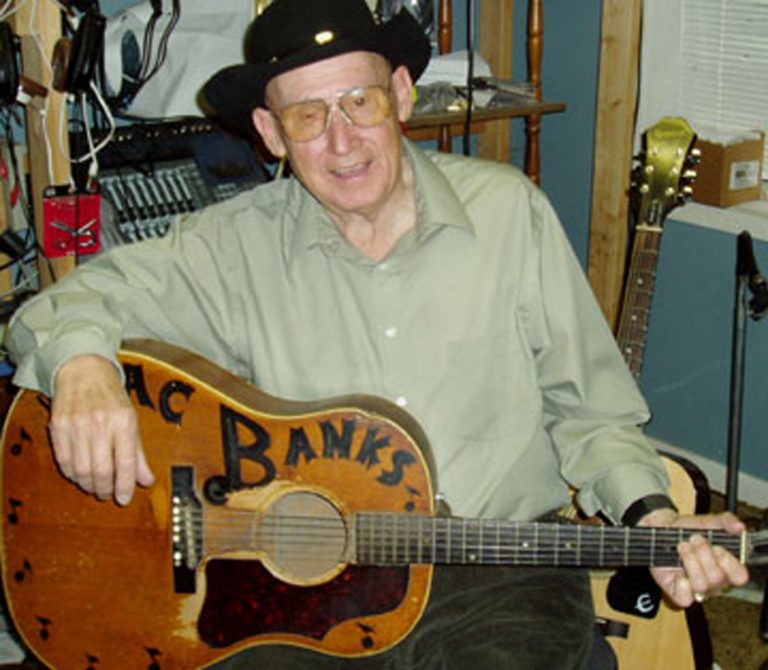Mack Elmore Banks was born on September 17, 1934, in Jasper, Alabama, and moved with his family to Columbus, Mississippi when he was six months old. The family lived for a while in the Hogeye community in Noxubee County, where his father worked as a sharecropper, and later settled in Artesia when Mack was in third grade. He graduated from the town’s tiny high school in 1953.
Banks’ mother played organ and piano in church, and Mack, the youngest child of ten, was the only sibling to actively take up music. He began playing guitar at eleven and wrote his first song at thirteen.
Banks started playing guitar when he was eleven and when he was sixteen, he began performing with the Columbus-based country band Red Morgan and the Roving Ramblers. Morgan, he recalls, specialized in the songs of Burl Ives. The group toured widely in the broader area, largely at school auditoriums, and advertised their engagements via a live radio program they played weekdays at 6 AM. An agent traveled in advance to arrange the shows, whose proceeds the group split with the schools. They also played Saturday events at stores with sponsorship from a feed company.
Banks also played for one summer with the Alabama-based bluegrass band Carl Sauceman and the Green Valley Boys, who had a Korean War-era national hit with “Wrap My Body In Old Glory”. Banks played bass with the band and also took on the comedic role of “Sparkplug.” The group also had a daily early morning radio show, broadcast over a powerful station in Carrolton, Alabama, and often played in theaters as well for regular Saturday night square dances.
After leaving the bluegrass band in 1951 Banks formed his own band and got his own radio show on Saturdays at WCBI in Columbus. He remembers singing songs by artists including Ernest Tubb, Eddy Arnold, and Hank Williams, and was also sometimes joined for duets by one of his sisters.
In the wake of Elvis Presley’s breakthrough in 1955, Banks “got on that style” and “went from hard-core country to rock’n’roll.” At Houston, Mississippi, radio station WCPC (620 AM), he made tape recordings of two songs, “Be-Boppin’ Daddy” and “You’re So Dumb,” which became local hits. With assistance from WCPC’s owner Robin Mathis, Banks recorded the songs in 1956 as a single under the name Mack Banks & His Drifting Troubadours for the Houston-based Fame label.
Mathis booked Johnny Cash and other rockabilly artists in the Houston area, and Banks performed at shows with many contemporary stars. Carl Perkins arranged a meeting with Banks and Sam Phillips of Sun Records in Memphis, but the day of the appointment Perkins’ song “Blue Suede Shoes” broke as a hit, and Phillips had to cancel the appointment. Phillips asked him to stay the next day, but Banks had to return home; he recalls that Jerry Lee Lewis was also present that day and stuck around for his successful audition the next day.
Banks continued performing and in the ‘60s recorded four singles for the Nashville-based Vee-Eight label, which also recorded Greenwood rockabilly artist Mack Allen Smith. Each of Banks’ singles featured a blues on one side and straight country on the other. He continued recording occasionally over the years for his own labels, often touching on topical issues including “Inflation” and “Lowndes County Police.”
Banks’ relationship to blues stretches back to his teen years when he worked at a gas station with a blues musician named “Shorty” who Banks recalls knew about ten to twelve songs, including Big Joe Williams’ “Baby Please Don’t Go.” Macon often performed at the station, and also backed Banks on country songs.
Williams, a native of Crawford, an established recording artist since the mid-‘30s, often returned home, and Banks first encountered him when he was 18 and working at a country grocery store that had a juke joint. Williams was playing outside to a large crowd, and Banks received orders from his boss to chase Big Joe away because he was thought to be draining off customers.
After founding Mack’s Western Supper Club in Crawford in 1967, Banks occasionally hired Williams to perform. He also recorded 14 songs by Williams, most of which disappeared, but in the mid-’70s Banks released a 45 on his MEB label with Williams’ “Sugar Hill” and “Watergate Blues.” It was likely the last country blues single recorded in Mississippi for the local market.
Banks himself performed at the Supper Club every weekend from 1967 until July 1994, when the club burned down. The club featured chicken wire in front of the stage to protect the band from flying bottles and beginning in the ‘80s it became a popular destination for students from Mississippi State. By this time Banks had stopped performing with a band and appeared solo with his guitar performing his own irreverent comedy songs.
From the mid-‘80s to the mid-‘90s Banks recorded five comedy albums that were largely aimed at the truck driver market. The owner of Shreveport’s Jewel-Paula Records encouraged Banks to enter the record distribution business, and in 1990 he expanded MEB Records to distribution, specializing in budget releases sold mostly via service stations. The business was run out of the club until the fire in 1994 and is currently based in West Point.
Today Banks continues to perform at local events and at the Sparta Opry once a month. He also continues to record when inspired, and in 2005 released on MEB a CD single of the topical blues, “Sad Times In New Orleans.”
–Scott Barretta

